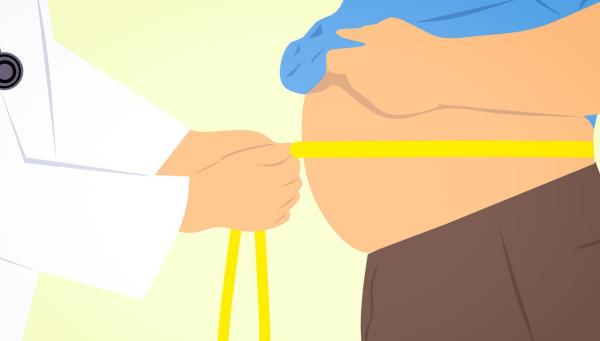There's an odd disconnect between the way we talk about the causes of obesity and the solutions we employ to help people manage their weight. When experts discuss the factors that contribute to weight gain, they emphasize how complex the problem is and why causes often vary from one individual to the next. Obesity ultimately comes down to the number of calories you consume and store versus the number you burn via exercise, Harvard Medical School explains, “but each of these factors is influenced by a combination of genes and environment”:
“Both can affect your physiology (such as how fast you burn calories) as well as your behavior (the types of foods you choose to eat, for instance). The interplay between all these factors begins at the moment of your conception and continues throughout your life.”
Much of this nuance disappears when we discuss possible solutions to obesity, though. According to the American Heart Association (AHA), for example, implementing educational interventions (e.g. calorie counts on menus) has not reduced obesity. The solution, therefore, lies in changing the “food environment” we inhabit, the AHA asserted:
“There is growing theoretical and scientific support for policies that intervene on environmental determinants of overeating. The implementation of some policies is facing resistance from the food and beverage industries … Evidence from behavioral economics has demonstrated that humans are heavily influenced by default conditions in their environment.”
Almost ten years have passed since the AHA published that paper in November 2012, which has given us ample time to investigate the effectiveness of these environmental interventions. Two conclusions jump out of the studies that have been conducted.
Read part two: Why We Can't 'Nudge,' or Tax, Obesity Out of Existence
First, interventions designed to change our environments, like limiting access to vending machines, don't do much to reduce obesity. Second, the researchers who reported these results are all but certain we just need more intense restrictions to achieve positive outcomes. Both results suggest that we need to find a new way to reduce obesity.
What do the studies show?
Since obese children often become obese adults, let's start with a September 2021 literature review examining efforts to reduce calorie intake in adolescents. The authors reviewed 52 clinical trials published between 2009 and 2019. Each paper investigated “school-based interventions, community-based interventions, interventions through mass media, and food sector interventions.”
Many of these were educational in nature (e.g., nutrition classes for parents and students), though nine studies looked at interventionist policies like school menu changes, increased physical activity during school hours, restrictions on TV food advertisements, and sugar taxes. Results:
"Overall, most of the intervention studies did not show consistent effects on changing children’s BMI. A large number of studies, mainly based on school interventions, did not show very effective results … In fact, the small weight reductions described in most studies could be clinically irrelevant."
Several factors may help explain these disappointing results, the authors wrote. The studies they reviewed may have failed to capture the success of specific policies for one reason or another; a trial may not have lasted long enough, for example. They also acknowledged the possibility that these interventions just “do not work,” but went on to reach a strange conclusion:
“Complex and multilevel interventions focused on environmental changes and the strengthening of individuals and communities, including family, as well as macro-policy changes will have the potential to tackle childhood obesity without increasing socioeconomic inequalities.”
It's not clear to me how they got there. All the “multilevel interventions” they examined did little to reduce childhood obesity; therefore, the world needs more multilevel interventions. Why is that? "Show you work, please," as my math teachers used to say.
This discrepancy between what researchers say the data show and what the data actually show seems common in obesity policy literature. A June 2019 Cochrane Collaboration systematic review examining policies designed to cut sugary beverage intake concluded that “effective, scalable interventions addressing SSB [sugar sweetened beverage] consumption at a population level exist.”
These interventions included price increases on soda, reduced access to SSBs in schools, and urban planning restrictions on new fast‐food restaurants. Digging a little deeper revealed that the evidence supporting these policies was far from conclusive. Of the 58 studies they reviewed, the authors noted that
“Only seven studies reported effects on body weight outcomes … The evidence included in this review was limited in quality, quantity and scope. Regarding quality, reporting bias was a major concern. Most studies in this review did not provide information on trial registration, protocol availability or prespecification of outcomes and analyses.”
The authors of a January 2022 study published in PloS One acknowledged what few other researchers seem willing to say: there is “very little evidence as to the effectiveness of policy-based obesity interventions at a population level or relating to societal or multilevel interventions in the UK.” The studies we've surveyed come from multiple countries, so there's no need to limit that conclusion to England or the US. These policies haven't worked anywhere they've been implemented.
The authors' solution was to model the effects of “hypothetical” calorie-reduction interventions on obesity, with special emphasis on how “social determinants” influence outcomes. But even in their modeled scenarios, reductions in childhood obesity were "modest"— a decrease from “18.3% to 16.8%; i.e., an 8.3% change.” And that was the largest effect they found in any of their four models.
What's the solution?
It's clear that interventions designed to alter the public's dietary habits haven't yielded much success. That prompts several questions: Why do obesity experts continue to promote policies that don't work? Why don't these policies work? Finally, what might actually work? We'll tackle these issues in part two.




